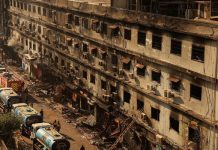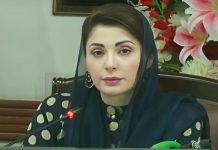Staff Report
ISLAMABAD: The Supreme Court of Pakistan on Wednesday ordered the government to allow the Pakistan Tehreek-e-Insaf (PTI) to organise their long march at a ground between H-9 and G-9 areas of the federal capital, amid rising political tension ahead of the much-hyped political rally.
During the proceedings, the Attorney General of Pakistan (AGP), Ashtar Ausaf Ali objected on allowing the political gathering at Srinagar Highway.
However, the top court directed the authorities to allow PTI to hold their gathering at the said venue and provide security for the same. The court also told the government to set free all arrested activists of the political party.
On the occasion, representatives of the PTI assured the court that no damage will take place to any property during the rally.
Earlier in the day, the Supreme Court, while hearing a petition against the closure of roads and raids on PTI workers, had asked the government led by the Pakistan Muslim League-Nawaz (PML-N) and the opposition Pakistan Tehreek-e-Insaf (PTI) to sit together and resolve the issue to avoid confrontation.
A three-judge bench of the apex court, led by Justice Ijaz ul Ahsan and comprising Justice Munib Akhtar and Justice Sayyed Mazahar Ali Akbar Naqvi, took up the petition filed by IHCBA President Shoaib Shaheen.
The bench said the government and PTI should come up with a venue to hold the demonstration and added that the PTI workers should record their protests and go home.
According to the SC, since the protest cannot be held on the Srinagar Highway, the Islamabad chief commissioner should inform the bench about an alternate venue by 2:30 pm.
After the break, the PTI informed the court that it wanted to hold its protest at H-9 Ground – the same place where JUI-F was allowed to organise its rally against the then ruling PTI.
PTI lawyer Babar Awan said PTI Chairman Imran Khan had four demands which include an end to road blockades, release of detained members, end to raids at houses and law chambers of PTI supporters, and upholding the sanctity of households by the government.
The top court gave both sides another hour to decide on the venue for the hearing and adjourned the hearing for another hour.
Prior to the break, Justice Ijazul Ahsan directed the chief commissioner to arrange an alternate venue for the long march and formulate a traffic plan to allow people to access the venue. “The Supreme Court wants that people’s daily routine is not disturbed,” Justice Ahsan added.
The top court will “provide them cover” if the PTI was afraid of arrests, the bench remarked while alluding to the spate of raids on the residences of the PTI members.
Justice Naqvi asked the attorney general whether the government had provided the PTI with alternative protest venues.
AGP Ashtar Ausaf said: “The government offered Democracy Park and some other locations to PTI to hold their protest but it was insistent on organising its rally on Srinagar Highway.” The blockade at Srinagar Highway would impact the entire capital, AGP Ausaf said. “But the highway has already been blocked,” the judge retorted.
The bench asked the interior secretary to inform the court as to why did the government closed the roads and arrested PTI leaders. The secretary responded that the police chiefs and relevant officials would answer for these arrests.
As the hearing resumed after a break, AGP Ausaf had said the government did not allow Imran to hold a sit-in at Srinagar Highway because of security threats. According to security agencies, Imran could become a target of suicide bombing, he added.
Earlier in the day, the bench summoned the interior secretary and the Islamabad police chief among others to submit a response.
At the outset of the hearing, Justice Ijazul Ahsan said schools and transport have been shut down while all hospitals were on an emergency alert. He added: “The country was going through a precarious economic condition and was on the brink of bankruptcy.”
According to the judge: “Will the government bring the entire country to a standstill in response to every protest.”
Attorney General Ashtar Ausaf said that he did not know about the situation in detail and sought time to gather information about the blockades. Justice Mazahar Ali Akbar Naqvi asked whether the AG didn’t know about the current situation.
Justice Naqvi added that half of the staff of the top court could not reach the SC as roads were blocked




